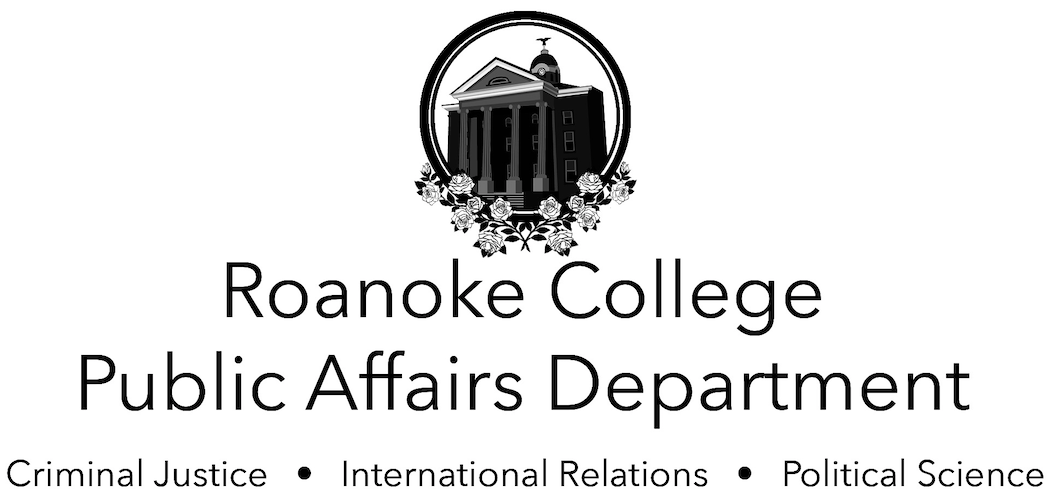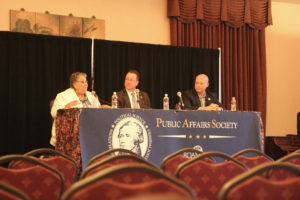Editor’s note: This is an essay from the Public Affairs Society, written by Kasey Reese and Alex Reynolds.
On October 13, 2016, the Roanoke College Public Affairs Society hosted a panel discussion titled, “Exploring the Police State.” The event was meant to foster discussion between students on campus and members of the community. Brenda Hale, the President of the Roanoke Chapter of NAACP, Roanoke County Sheriff Eric Orange, and Tom Rambo, the Director of Campus Safety at Roanoke College, served as the distinguished panelists for the evening. Kasey Reese, Bekah Carey, and Terry Ramirez served as PAS moderators and hosts for the event.
This panel lecture was the first in a series entitled “Has the Republic Fallen?” an ongoing discussion that explores whether or not the United States has made good use of the freedoms secured by our founding fathers. To some it can be argued that the expansion of police forces in the United States is an indication of the loss of personal liberty and freedom in exchange for security. However, as Bekah Carey highlighted, the purpose of police forces is Lockean in nature, due to the fact that they are meant to serve as the impartial arbitrator in conflicts. In other words, no one can be his or her own judge. The intention of the panel discussion was to illuminate the place police forces have in our republic and to discuss the tensions between police and the community.
In light of contemporary events, Brenda Hale shared her views on the Black Lives Matter movement. Ms. Hale adamantly stressed the importance of the Black Lives Matter movement as a venue for political discourse about bias and racism, which unfortunately, manifest in exchanges between the police and members of the community. For example, Ms. Hale enumerated various instances where community members felt as though they were stopped and profiled because of the color of their skin.
To support Ms. Hale’s claims, a student in the audience explained that as a person of color, it sometimes feels dangerous to walk outside at night, particularly while wearing clothing that has become associated with deviant behavior, such as “the black hoodie.” His main concern was how members of the community and the police can work together to address these uncomfortable situations.
Sheriff Orange stated that during the hiring process, he always aims to screen out individuals that display narrow-minded views of any kind that disparage other individuals or minority groups. There is no place for that sort of mentality in the realm of public service. Furthermore, when reviewing incident reports that detail situations in which force was used, Sheriff Orange first reads the sections about the suspect’s or victim’s behavior and the officer’s justifications for the use of force, before he reads the section that describes the appearance of the individuals. If at anytime he feels as though professional conduct has been breached, he takes it upon himself to extensively investigate matters further.
Moreover, he spends a significant amount of time within the community to discuss these various issues. For example, his department hosted a police night, where officers were able to socialize with community members and children in an effort to “humanize” police officers. Sheriff Orange does not want people to forget that officers are members of the community themselves – they have families, hobbies, and homes in the Valley.
Mr. Rambo, drawing from his experience as a police officer in Philadelphia, emphasized the importance of training, open door policies, and carefully crafted procedures. Training that focuses on race relations between the police and the community is an important aspect that brings underlying issue to the minds of police officers. If they are equipped with the ideas and concerns of the community, which are integrated into training programs, they are more likely to make better decision in the face of uncertain situations, while still being cognizant of personal rights and liberties.
Open door policies are important for transparency and community outreach. This transparency is what Brenda Hale and the NAACP advocate for, especially when considering the recent string of police shootings. Sheriff Orange gets multiple calls a week from concerned citizens, regarding all types of issues. He takes every concern seriously and makes a point to weigh all facts, opinions, and evidence in his review process. It is a continual effort to ensure that both officers under his command are held accountable and the community is safe.
Mr. Rambo again emphasized the importance of procedure when dealing with difficult situations. There are very clear rules established in the departments to guide officers on the streets. It is important to understand that the procedures give officers practical guidelines to keep themselves, the community, and suspects safe. In essence, it is these procedures that help bridge the gap between ensuring the safety of the community and maintaining the rights of innocent people.
Ultimately, relations between the police and the community are complex and multifaceted. Threat assessment, the environment, training, the character of the individual, and even language barriers, are all elements that go into a confrontational situation. One cannot understand policing in the United States without considering all of these elements. In a republic, it is the vox populi, the voice of the people, which brings attention and solutions to issues like the tensions being experienced today between the police and the community. The power of discussion is immense, which is why panels like “Exploring The Police State” are worth the time and effort. Without communication there is no transparency, no middle ground, no understanding; without free and open discourse, there is no republic.

